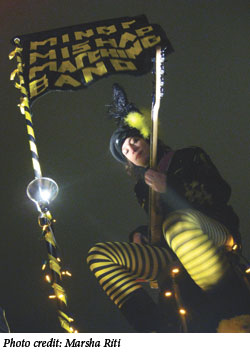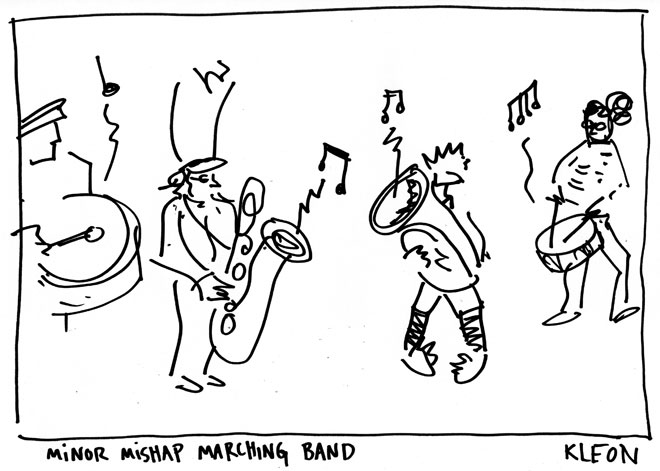Street Sounds

It’s never too late to run away with the circus, and sometimes you don’t have to go far. That thought was running through my head as I played a gypsy waltz under I-35 in downtown Austin with the Minor Mishap Marching Band. It was a Sunday afternoon, and we were dressed in our bright yellow and black uniforms. I was strumming a chunky upbeat rhythm on the banjo. Trombones poked at the sky. Snares rattled the sidewalk. A tuba groove kept us moving forward. As we stepped under the overpass, the sound came bouncing back at us, the clarinets’ soulful whine swirling up and around like swallows at dusk. The band slowed and jammed, enjoying the accidental amphitheater. And all around us was our captive audience, dozens of people in cars waiting for the light to change, some unrolling their windows to grin and wonder how the hell a highway intersection can also be a party.
 When the founder and queen bee of Minor Mishap, Datri Bean, asked my wife and me last November to join a marching band for a New Year’s parade, it seemed like a lark. I figured, if nothing else, I would get to dress in funny clothes, march around and make some noise. Little did I know that Minor Mishap would end up as some kind of squawking musical collective that wouldn’t need an excuse to go parading around town, even stopping to serenade a highway overpass. And we are not alone. There are literally dozens of do-it-yourself marching bands across the country, and this October we converged at the fourth annual HONK! Festival in Boston, the epicenter of this nascent movement: thousands of us wailing, banging, howling, riffing in the streets like a single organism. I wasn’t just joining a band, I was joining some sort of freak movement.
When the founder and queen bee of Minor Mishap, Datri Bean, asked my wife and me last November to join a marching band for a New Year’s parade, it seemed like a lark. I figured, if nothing else, I would get to dress in funny clothes, march around and make some noise. Little did I know that Minor Mishap would end up as some kind of squawking musical collective that wouldn’t need an excuse to go parading around town, even stopping to serenade a highway overpass. And we are not alone. There are literally dozens of do-it-yourself marching bands across the country, and this October we converged at the fourth annual HONK! Festival in Boston, the epicenter of this nascent movement: thousands of us wailing, banging, howling, riffing in the streets like a single organism. I wasn’t just joining a band, I was joining some sort of freak movement.
Marching bands were originally used to inspire soldiers to carry on, the heavy brass and drums keeping tired legs on the march, but the new crop of marching bands turns this tactic on its head. Around 10 years ago, marching bands started to block streets and disrupt events at protests, a strategy that is more disarming and fun than groups of black-hooded anarchists armed with bolt cutters and spray paint. (Plus, the police know that using tear gas on a marching band never looks good.) Datri was inspired by one of these radical bands, a Seattle outfit called the Infernal Noise Brigade. The Brigade was formed at the legendary World Trade Organization protest in Seattle in 1999 and continued to raise hell for years after. The editors of Seattle’s alternative newspaper, The Stranger, learned the hard way what the group meant by infernal noise. After they endorsed the Iraq invasion, the Brigade came to their offices with horns and an air-raid siren to express their displeasure.

The Minor Mishap Marching Band is not overtly political—we have yet to challenge a phalanx of cops in riot gear with our loaded trombones—but something happens on our impromptu neighborhood marches that feels like activism, or at least a spirited defense of public space. Most of the time, the city is a collection of private homes and businesses divided by roads and sidewalks, and when the lines get blurred—well, that means someone just drove into your living room. Streets are designed to get us around, but they also manage to keep us apart. But when we head out on a march, people come out of homes and into the street—some of them to dance, even occasionally to join in, like when a couple of little kids ran out of their home and started to follow us. We sent them back inside to get permission from their parents and put on shoes, then handed them bells and claves before we set out on a groove. “Building community is a political act,” Datri says. “Most of us live in isolation.”
That’s what one marching band can do. Twenty-six freaky marching bands all in the same place create some kind of alternate universe, where smiling at strangers is encouraged and dancing in the streets is expected. That’s what we found at HONK!, where there were marching bands as big as armies, like New York’s Rude Mechanical Orchestra; groups that made the term punk-rock marching band make sense, like What Cheer! from Providence; and bands that tossed off Balkan tunes with an easy virtuosity, like Seattle’s Orchestar Zirkonium. Although no one seemed to be in charge, the festival managed to be well-organized, with each band playing scheduled shows in squares and small pocket parks, then coming together in a parade with police escorts. The thousands of players were all hosted in private homes and fed each night at huge sprawling jam sessions. I’m no radical, but I know effective collective action when I see it.
Minor Mishap came back from HONK! with a renewed sense of purpose, ready to strut down the street, scare away the cars and give the asphalt back to the people. Like a river cutting through rock, we’ll keep blowing hard at freeway overpasses, and one day, they may come tumbling down.


